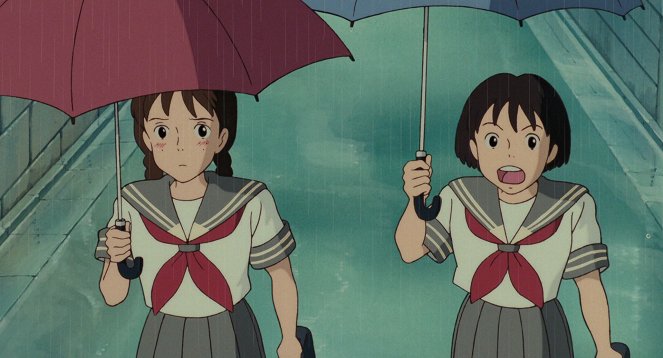Directed by:
Yoshifumi KondōScreenplay:
Hayao MiyazakiComposer:
Yūji NomiCast:
Yōko Honna, Takashi Tachibana, Shirō Kishibe, Naohisa Inoue, 室井滋, 高橋一生, Keiju Kobayashi, Toshio SuzukiPlots(1)
Teenage Shizuku has a passion for books and plans to spend her last summer holiday in junior high school reading in the library and translating popular foreign music into Japanese. But her plans are disrupted when she discovers that the same name, Seiji Amasawa, appears on each of the books she borrows. One day while riding the train, she encounters a mysterious cat who will eventually lead her to the shop where Seiji works as a trainee violin-maker. Shizuku learns that Seiji dreams of one day taking up his craft in Italy, while he encourages her to write. Although their dreams may eventually lead them to very different places, Shizuku and Seiji vow to be true to the strong bond between them. (StudioCanal UK)
(more)Reviews (2)
Whisper of the Heart may radiate simplicity and subtlety, but it is by no means an ordinary story. First love is rather more of a backdrop, albeit a captivating and moving one, for a much more substantial narrative about the gradual blossoming and refinement of a talented young man. In this respect, Miyazaki’s screenplay is pleasantly surprising in the serious and complex way it develops the motif of the search for self-realisation and following one’s own dream. Instead of superficially uplifting formulas and simplistic bits of wisdom about the great talent in whose thrall the creator finds himself, we have here a detailed treatise on the fact that, though it brings fulfilment and satisfaction, the journey to self-realisation primarily requires determination and diligence. All of this is wrapped up in a captivatingly fragile narrative that, despite viewers’ expectations and the promotional trailers, avoids excursions into the world of fantasy. Rather, it mesmerises with perfectly observed small gestures, details and coincidences of everyday life and a heartfelt celebration of the beauty of things and works created by the hands of craftsmen (from an old clock to a violin to a handwritten story). In its time, the film had an even more powerful message that brought hope and an appreciation of the everyday to Japanese people who were just beginning to intensely feel the bursting of their economic bubble. After the era of emphasising material values and virtual finances, Studio Ghibli thus showed the youth of that time values of a more permanent and, in terms of personal fulfilment, more rewarding nature. Though the film was made under Miyazaki’s screenwriting and production supervision, the creative input of first-time animator Yoshifumi Kondó can be seen in the charming simplicity and realism, which contrasts with the style of both Miyazaki and Takahata. His sudden death had a significant impact on Studio Ghibli, for which Kondó was to become the new core director who would eventually take over the reins from the aging masters. It wasn’t until fifteen years later that Hiromasa Yonebayashi followed in Kondó’s footsteps, but only in terms of his career, not in terms of his style.
()
What a beautiful movie that was. For a while, I felt like the weeks were passing by and I felt like I was living those weeks with them. But the ending was still far away – not bad at all in this case. Best exchange: "I pictured him differently, quiet, calm..." – "You read too many books!" – "Probably like you!" If you haven't seen it, you won't understand, but I recommend you do :-) I really enjoyed this scene. I kind of enjoyed the whole movie in general and it's one of those types where it shows ordinary life, everyday life, only here it's rendered so beautifully... it's almost like I was there and saw everything, almost like I was the wind blowing on them, the sun shining on them, the stars looking down on them... A really beautiful film. And the ending was subarashii!
()
Gallery (41)
Photo © Studio Ghibli


Ads